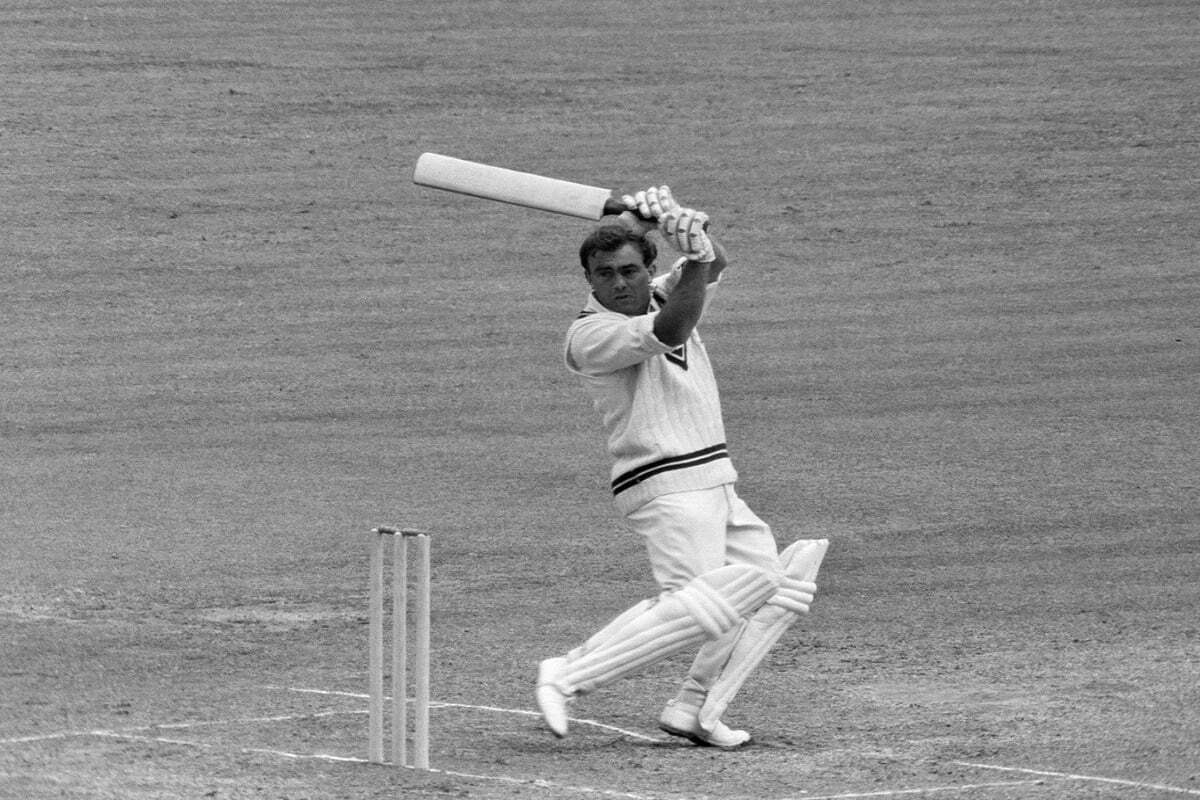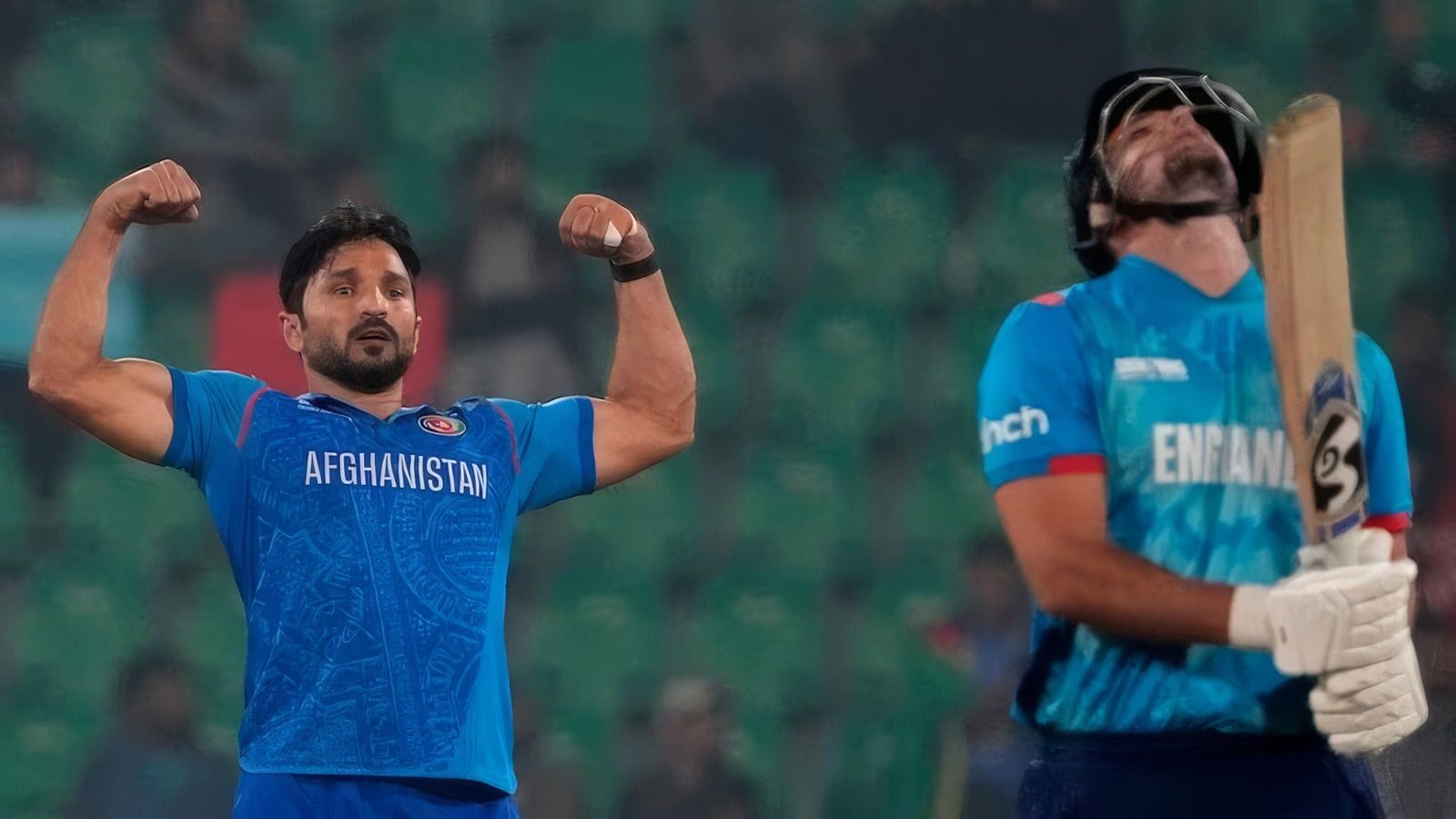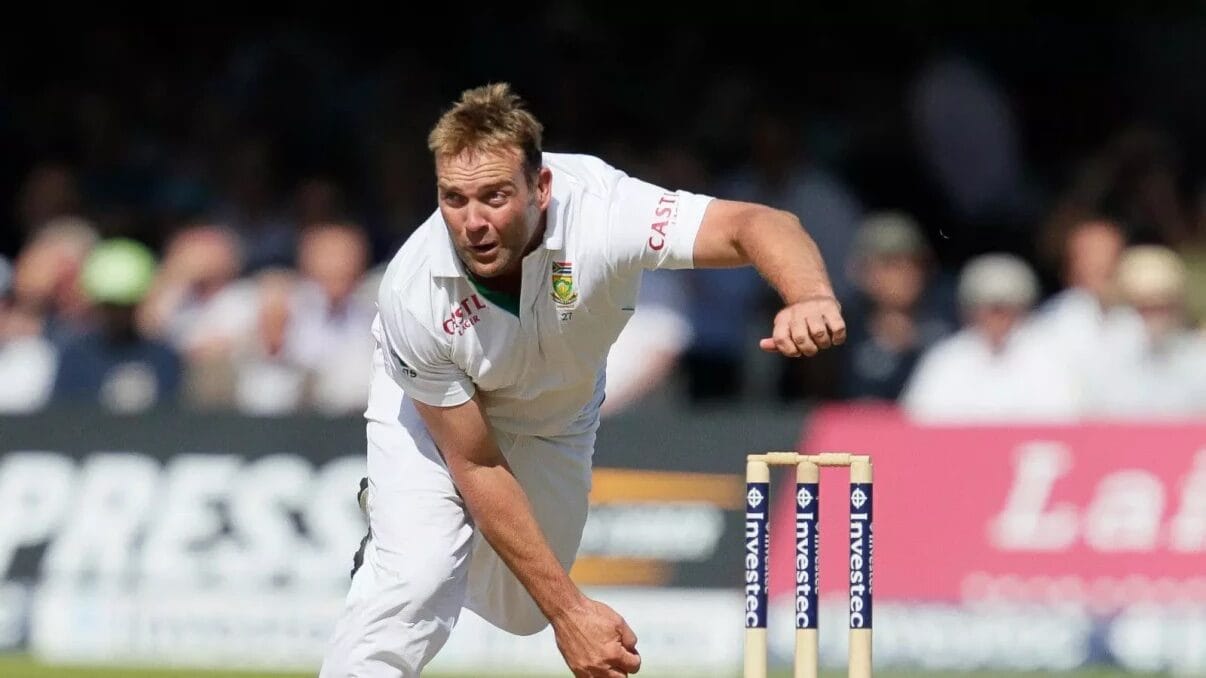Cricket people love debating whether a particular player is great or simply very good. “Great” tends to be over-used but people engaged in this sort of discussion tend to know what they are talking about. Even so, setting the parameters, let alone agreeing on who falls on either side can be challenging. How important is the career average? Isn’t a crucial forty in torrid conditions more valuable than a mid-innings century on a featherbed? Do aesthetics play a part? Few batsmen encapsulate the dilemma of the great / very good debate more tantalisingly that the former England left-hander John Edrich, who died last week aged 83 after a 20 year battle with leukaemia.
Edrich was virtually a fixture at the top of the order for over a decade from 1963 to 1976. He was a no-nonsense operator, utterly courageous and utterly determined. He was, essentially, a one-dimensional cricketer. He didn’t bowl. He turned himself into a specialist at gulley but no one would have called him a great fielder. He was an ordinary captain of Surrey, and, as a stand-in, England. But he scored almost 40,000 runs in first-class cricket, mostly for Surrey in a career which lasted from 1958 to 1978, and was one of only 25 players to make a hundred first-class hundreds, and is one of only four England players to have made a triple century in a Test match. He had a Test average of 43.54 from 77 matches. To put that in context it compares interestingly with his – more or less – contemporaries, Geoffrey Boycott (47.22), Ted Dexter (47.89), Dennis Amiss (46.30), Colin Cowdrey (44.06) and Tom Graveney (44.78). (Ken Barrington is in a different league on 58.67.)
There are various books by pundits choosing their “Hundred Greatest”. I have two, by John Woodcock and Christopher Martin-Jenkins. They both pick Dexter, Cowdrey, Barrington and Boycott, but Edrich isn’t mentioned.
To stay with the figures for a little longer, during Edrich’s career, and always before that and for much of the time since, an England cricketer was judged on his performances against Australia. Ashes Tests simply had that extra something. By this yardstick, Edrich was exceptional. Seven of his twelve Test hundreds were scored against Australia (the others came against New Zealand (3), West Indies and India). He is one of only 13 batsmen to have scored over 2,000 runs in Ashes Tests; of that select group, only Don Bradman, Steve Smith, Herbert Sutcliffe, Steve Waugh, Allan Border, Jack Hobbs and Walter Hammond have averaged more than his 48.96. It is as true now as was then than no greater challenge confronts an England batsman than the conditions facing him in Australia. There, Edrich averaged 55.78. Boycott, in comparison, averaged 45.03.
I must have seen Edrich batting quite often in the late 1960s and the 1970s, when I watched a lot of cricket. I think the first time was my first visit to an Ashes Test, at Edgbaston in 1968. We were there on the fourth day and I will never forget – I have written about this before – watching Tom Graveney batting on a sunlit Birmingham evening (no, it doesn’t really work does it…). Graveney was one of those players whom, if you were lucky to see him when he was in the mood, could make an impression that would last a lifetime. Looking at the score card now, I see that Graveney came in when the score was 57 for one, on Boycott’s dismissal for 31, and put on 74 with Edrich (apparently in 55 minutes). Edrich was then out for 64. But I have no recollection of Edrich’s innings.
I was at Lord’s on the third day (Saturday) of the second Ashes Test of 1975. In retrospect this was quite a pivotal day in Ashes history. England – particularly her batsmen – were still reeling from a 4-1 defeat Down Under a few months earlier, principally at the hands of fast bowlers Dennis Lillee and Jeff Thomson. Australia had won the first Test at Edgbaston by an innings and plenty (Lillee five for 15 in the first innings, Thomson five for 38 in the second). How could England counter this?
Well, there was a new captain, Tony Greig, in place of Mike Denness. The uncapped, grey-haired David Steele (the “bank clerk who went to war”) came in to bolster the middle order. Greig, Steele and Alan Knott made fifties in England’s first innings of 315 and bowled Australia out for 268 (John Snow, ignored by the selectors for the winter tour, to the Australian captain Ian Chappell’s great relief, four for 64). England’s openers, Edrich and Barry Wood, had to face one over on Friday evening.
The Saturday of the Lord’s Test, especially against Australia, is always an event. This one, it must be said, was not the most exciting I have witnessed. England scored 225 runs in 95 overs for the loss of two wickets. Edrich batted all day and carried on on Monday (a prior engagement prevented my attendance) batting in all for 538 minutes and scoring 175. He quickened up on the second day and England had the better of a draw and drew the remaining games as well.
Edrich played a leading role in that process as he had in Ray Illingworth ‘s highly professional side – by the standards of the day – between 1969 and 1972. And he did it all without being especially memorable. He was, however, highly distinctive. As I say I saw him live quite a few times and must have seen a lot of him on television. I certainly have a very clear image of him in my mind’s eye. He was not a tall man – 5’8”- but solidly built with very bushy eyebrows and strong, hairy forearms. As a batsman he was incredibly efficient – what they used to call a percentage player. There was minimal footwork, though he was a fine player of spin. Unlike many left-handers of his size and shape he was not an exceptionally strong cutter or puller preferring to play his attacking shots straight or through the covers, and being an expert nudger and nerdler of singles. Boycott, for many years his England opening partner picked him to open with himself (of course) in his ideal eleven of England players of his time (he could have picked Amiss or Graham Gooch. It was interesting. He said there was nothing “special” about Edrich. He just had the knack of making runs even when he wasn’t looking good.
There are some curious contradictions in Edrich’s career. Dexter said he walked out to open the innings for England as though it was the only position he had ever contemplated. He opened in his first Test, at Old Trafford against the West Indies in 1963. He opened in his last Test, also at Old Trafford against the West Indies in 1976. He was opening when he made his first Test century, against Australia at Lord’s in 1964. He was opening in those two innings I saw, in 1968 and 1975. Yet in Australia where he was so successful, he played 15 Tests and had 26 innings but opened only five times, all on Illingworth ‘s triumphant tour of 1970-71. In 1965-66 Boycott opened with Bob Barber and Edrich batted at 3 (375 runs at 46.87, with a century in England’s innings win at Sydney). In 1974-75, he batted at 3 or 4 and headed the averages with 260 runs at 43.43. The opening duties were shared, with various degrees of discomfort, between Amiss, Brian Luckhurst, David Lloyd and the 43 year-old Cowdrey (Boycott was “unavailable”). In 1970-71 Boycott and Luckhurst opened in the first, second and fourth and fifthTests (the third was abandoned without a ball being bowled) with great success but Luckhurst broke a finger in the course of making a hundred in the first innings of the fifth and Edrich moved up one spot, making 74 not out in the second innings. He opened with Boycott in the sixth Test at Adelaide – he made a century in the first innings and Boycott made one in the second and they added over a hundred together in both – and with Luckhurst in the seventh at Sydney, which England won to regain the Ashes (Edrich made 30 and 57 and averaged 72 in the series (to Boycott’s 93).
Another contradiction is suggested by that Lord’s innings in 1975. It was in many ways a typical Edrich innings. He displayed the courage against fast bowling for which he was renowned, albeit on a rather docile Lord’s wicket. (Younger readers (i.e., anybody under about 50) need to remember that batsmen did not wear helmets till the late’70s: I think that is at least partly why I have a clearer recollection in my mind’s eye of Edrich than of, say, Dominic Sibley.) Also it just wasn’t particularly memorable. The records show he hit 21 boundaries. I really think most of them must have come on the Monday, when he definitely speeded up. But one of the most extraordinary things about Edrich is that he is still the holder of a remarkable record. Nobody has ever hit more boundaries in a Test innings – 52 fours and five sixes – than he struck in his 310 not out against New Zealand at Headingley in 1965. It wasn’t against Lillee and Thomson, but in helpful conditions at the start the New Zealand pace attack of Dick Motz, Bruce Taylor and Richard Collinge was more than simply respectable. (New Zealand were bowled out for 193 and 166.)
Edrich was born in Blofeld, Norfolk, not far from the birthplace of the eponymous Henry, and not far either from that of his England contemporary Peter Parfitt (career average 40.91 in 37 matches). The Edriches were cricketing royalty in Norfolk. Cousin Bill was a legend because of his exploits for England with his Middlesex “twin” Denis Compton; Bill’s three brothers, Geoff, Eric and Brian, all played county cricket.
Young John joined the Surrey groundstaff in 1955 and made his debut for the first team in 1956. He had an outstanding first full season in 1959, scoring 1,799 runs at an average of 52.91.
An opportunity for England came after the Ashes tour of 1962-63. The Lancashire left-hander Geoff Pullar had a moderate tour and his opening partner, the Rev David Sheppard had his mind on higher things. So England had a new look opening pair for the first Test against the West Indies at Old Trafford, Edrich opening with his Surrey partner Mickey Stewart (the father of Alec, with Barrington, another Surrey man, coming in at three.
Edrich played in three matches of that exceptionally challenging series, making a top score of 38. He toured India with. Mike Smith’s tram but was one of a number of victims of illness and played in only two of the five Tests. Recalled for the second Ashes Test of 1964 at Lord’s he made 120, but was then dropped again and missed Smith’s tour of South Africa in 1964-65.
1965 was the breakthrough year, with the triple century and he seemed to be established for a while. In his autobiography (Runs In The Family, geddit?) Edrich said that he went to the Lord’s Test match [ against South Africa, in the second half of the summer of ‘65] feeling more like a Test cricketer than I had ever felt before”. But as he recounts he was steamrollered by fast bowler Peter Pollock (father of Shaun) who had him leg before for a duck in the first innings and literally knocked him out with a bouncer in the second. According to Dexter “it was the most direct blow on the (unhelmeted) head I ever saw …; he remains one of the few batsmen to live through such an experience and emerge with his nerve almost wholly intact.”
He had done enough to earn a trip to Australia under Smith. The following summer, however, another dominant West Indies team, under Gary Sobers, saw wholesale changes to the England side and Edrich was one of a number of players, including two captains, Smith and Cowdrey, to be dropped. But he was back, opening the innings with Boycott in all five Tests in the Caribbean in 1967-68 and scoring 146 in the third at Bridgetown.
He had three different opening partners in the 1968 Ashes, Boycott giving way to first Roger Prideaux and then Colin Milburn, in the fifth Test at The Oval Everyone remembers that game for the brilliant, not just game+ changing but world- changing performance by Basil D’Oliveira, and the thrilling final afternoon, when Derek Underwood bowled the Australians out to level the series. It tends to be forgotten that Edrich top scored in England’s first innings with 164.
When Illingworth replaced Cowdrey as captain at the beginning of 1969, Edrich was in his element. They were kindred spirits. As a misguided sop to his pride Cowdrey was appointed vice- captain on the 1970-71 but there was no doubt as to who was the captain’s most trusted lieutenant. Years later Illingworth made Edrich the England batting coach.
With quite a few former players pundits say “Well, he’d have been fantastic at T20!” Nobody is ever going to say that about John Edrich but it is worth noting that he won the match award in the first ever one day international, played, to Illingworth’s great annoyance in place of, as it were, the abandoned Melbourne Test of 1970-71.
We can never really decide for sure whether someone is a truly great player. With Edrich, one keeps coming back to his courage under fire. There have been other players who have seemed to relish facing fast bowling – Robin Smith comes to mind among England players. (One always comes back to Maurice Leyland’s famous comment “None of us like it, but some of us don’t let on.” But Edrich was outstanding.
What must surely be one of the most alarming passages of play ever seen in a Test match occurred on the third evening of the third Test against the West Indies at Old Trafford in 1976. It was England’s second innings. The openers were Edrich (38) and Brian Close (46). (Boycott was still unavailable.) The bowlers were Andy Roberts and Saint Michael Holding of Sky (as he has since become). The batsmen were subjected to a merciless barrage of very fast short-pitched bowling; 80 minutes of what the Wisden match report referred to as “disquieting cricket”. Holding was eventually warned by the umpires. The batsmen got through it. But neither played for England again.
It wasn’t much easier in Australia in ’74-75 when the exception pace and unpredictability of Thomson and the rapidity and skill of Lillee posed almost insurmountable problems for the England batsmen. Australia won the first Test at Brisbane by 168 runs (Thomson six for 46 in the second innings). Greig made a hundred in England’s first innings. Edrich made 48 in three and a half hours. In the course of that innings his hand was broken by a ball from Thomson, and although he carried on batting, he missed the next Test, which England also lost.
The Boxing Day Test at Melbourne was a remarkable draw, Australia finishing eight wickets down on the final evening. The four team scores were all within the range of 238 to 242. Edrich made 49 in England’s first innings; he was given out caught behind when keeper Rod Marsh was appealing for a stumping, a classic piece of Australian umpiring.
Edrich was in charge for the fourth Test in Sydney. Denness dropped himself. (He was back for the fifth, which Australia also won massively but in the sixth, when Lillee and Thomson were both injured, he got a big hundred and helped his side to a consolation victory.)
Anyway, at Sydney, after the excitement of Melbourne it was back to normal. England were set a notional 400 to win – their 295 in the first innings (Knott 83, Edrich 50 in three and three-quarter hours) was their highest score in the series so far.
In the 16th over of their second innings on the final day England were 68 for no wicket but they slid to 74 for three and their stand-in captain had retired hurt having been hit a crippling blow in the torso by the first ball he received, a fast skidding delivery from Lillee. He returned, though, “strapped and sedated”, as Wisden put it, with the score on 156 for six. He batted with the tail, principally Bob Willis and Geoff Arnold, for two and a half hours. When Arnold was out, he was left stranded on 33 not out, with 5.3 overs left.
He missed the next Test. It turned out he’d fractured two ribs.





8 comments
Sam liddle
Thanks Bill; a lovely tribute. I remember that as a seven year-old living near Dublin in the mid-60s, I cut a photo of Edrich and another of John Hampshire from my father’s newspaper and they adorned the wall of our playroom; my first sporting heroes. I’m not sure what that says about me or my cricketing ambitions
Binoy Dubey
Thanks Bill. Well deserving tribute to this great cricketer- John Erdrich. Very well written article!!
Malcolm Merry
Not exactly great but a true test cricketer of the sort England have lacked in the past 25 years.
E was a persistent victim of the 2-tests and your out selectorial mentality of his era. In ’63 after a respectable start he was dropped for the mighty Brian Bolus. Mediocre performances in 1972 led to his dropping but he fought back two years later with a gritty 100 in the test trial at Worcester. The final axing in ’76 came after he and Close put on that battling stand on an atrocious OT pitch, by far the largest of England’s innings. To say they never played again implies that they failed!
E’s 120 in 1964 was more than half the runs from the bat in the England innings. After the end of that series he was out again.
Nambi
Thank you Bill, excellent article and eulogy to the great man
Trevor
Thank you Bill. That brings back lots of memories, in particular a damp, dark day at Old Trafford in 1968, the First Test against Australia when Boycott and Edrich opened the batting for England. The players were on and off until the umpires finally gave up in late afternoon. The conditions were atrocious with the ball seaming all over the place, but Boycott and Edrich just went about their business, quietly and efficiently, reaching 60 odd without loss by the close. It was typical Boycott and typical Edrich, and an example of the latter’s supreme batting skill. He was not eye catching as you make clear but in his own way he was great and, as that awful evening at Old Trafford in 1976 made so apparent, as brave as they came.
Will Inglis
Thanks Bill. I, too, have memories of watching Edrich bat for long periods, valuably and unmemorably. You are right that statistically Barrington was in a different league to his England contemporaries, but I’m not sure that he was necessarily more important to the side. A lot of his runs came against the weaker Test teams of his time.
Piers Pottinger
A full and fascinating summary of a courageous man
Rory Miller
My memory, as your pictures suggest, Bill, is that it was very rare to see him batting in a cap. I must have seen him at Southampton in the 1960s but, like you, I have no memories of watching him.